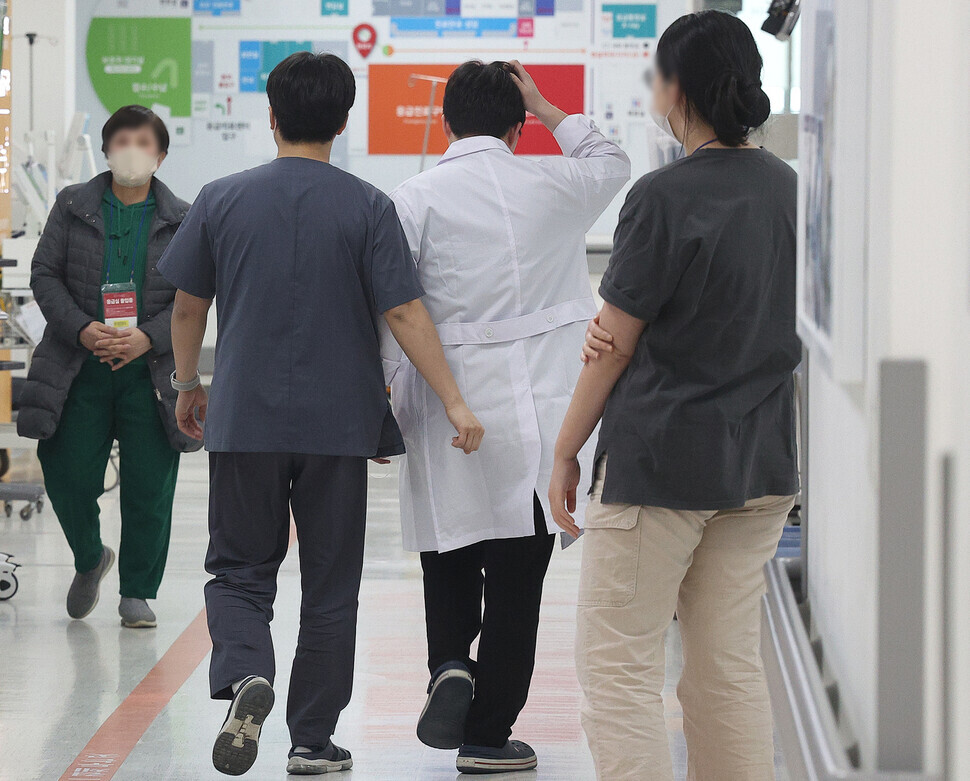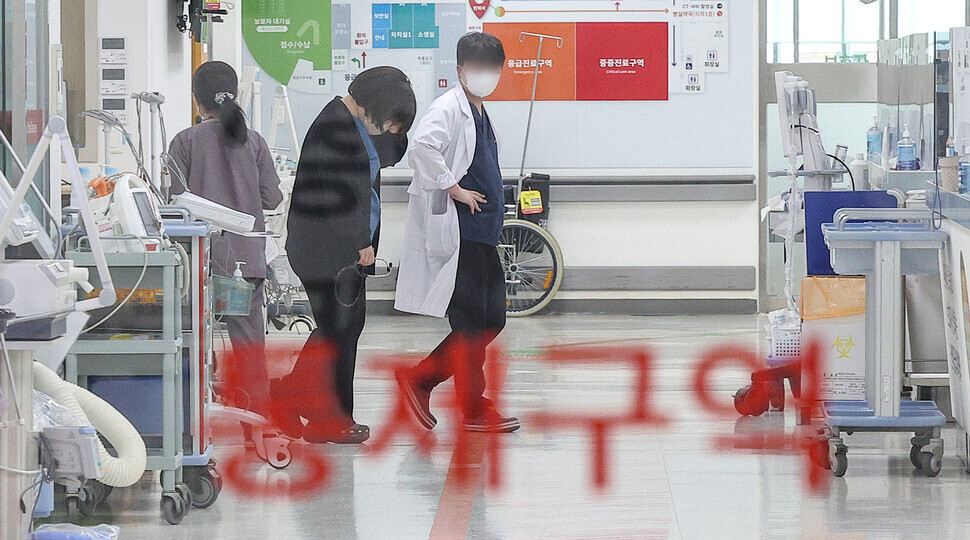hankyoreh
Links to other country sites 다른 나라 사이트 링크
‘Without us it’d collapse’: Faculty pull 90-hour week in major Korean hospitals amid trainee walkout

“Some of the professors and fellows are working 90-hour weeks. If this keeps up for another two weeks or longer, doctors are going to start collapsing.”
This was the prediction Tuesday by an emergency medicine professor at one of the so-called “big five” hospitals in Korea, where interns and residents have walked off the job en masse.
Faculty members at the hospitals have traditionally shouldered administration, education and research responsibilities in addition to their treatment duties. The assessment was that with the remaining physicians suspending their other duties and focusing exclusively on treatment while more than doubling their working hours, the situation has become unsustainable.
Tuesday marked over a week since the interns and residents walked away from hospitals to protest an administration measure increasing the admissions cap for medical colleges. For the remaining medical professionals who are picking up their slack, the excessive workload has only grown.
Faculty members have managed to keep the facilities operating by taking turns performing the interns’ and residents’ duties, up to and including such basic activities as dressing wounds and removing catheters.
But many are concerned that burnout could lead to a health care system collapse.
The emergency medicine department at Hallym University Sacred Heart Hospital, where all six interns and residents tendered their resignations, has been effectively paralyzed. With 11 specialists already dividing up the duties that the six interns and residents performed, they have had to wrestle with increased patient numbers as many who had previously been visiting secondary hospitals have begun flocking to tertiary hospitals instead.
“I worked 88 hours a week back when I was an intern and resident, and I think I’m doing about the same right now,” said Lee Hyung-min, a professor of emergency medicine at Hallym University Sacred Heart Hospital. “The workload has effectively more than doubled from before.”
Lee also stressed that the fact that professors like himself are holding out despite how difficult it’s been does not mean that they agree with the administration’s policies. “The government needs to know that we’re sticking it out because it would collapse without us,” he said.

The workload issues are even more severe at tertiary hospitals outside the Seoul metropolitan area, where health care infrastructure is less robust. The capital region at least has secondary hospitals where patients can be transferred; that is not an option in the provinces, which means that health care workers are often facing situations where they have to work for three straight days without a break.
“We lost all three of the interns and residents in the hospital’s emergency medicine department, and the other two [specialists] now have to make up the difference, so obviously the number of workdays has increased,” said a specialist at one regional general hospital.
“Without interns and residents, faculty members also have to perform medical duties, so they’re unable to engage in any outside activities. They’ve had to cancel their association work and devote themselves exclusively to hospital duties,” they explained.
Also struggling with intense workloads are nurses, who have been filling the gap left behind by the interns and residents. The burden has been especially severe for physician assistant nurses, who have been performing the operation, treatment, and prescription duties that the interns and residents previously handled.
“Physician assistant nurses who usually only work during daytime hours have had to perform duties, so they’ve ended up with the kind of schedule that the interns and residents had, where they work 30-something hours straight until the next morning,” said a nurse at one regional tertiary general hospital.
Observers have voiced fears that a health care system collapse could be imminent as more and more workers burn out.
“The remaining faculty members have been worried that we might have to shut down if this keeps going for longer and everyone burns out,” said Yoo In-sool, a professor of emergency medicine at Chungnam National University Hospital.
A professor in their 50s who works as a pediatric cancer specialist for a public healthcare institution in the Seoul area said, “It’s been difficult, but we’ve been toughing it out so far.”
“We’re so overloaded that there have been cases of mixing up the prescription dates for cancer medications because we lose track of what day of the week it is,” they added.
“If this keeps going for longer, I don’t know what we’ll do.”
The director of a tertiary hospital in the Seoul area said, “These duties have been causing growing fatigue for faculty members in life-or-death internal medicine and surgery fields.”
“There’s been talk about fellows and third- and fourth-year interns and residents walking away beginning next week, which means the situation could get a lot more difficult,” they added.
By Shim Wu-sam, staff reporter; Goh Gyoung-ju, staff reporter; Go Na-rin, staff reporter; Jeong Bong-bi, staff reporter
Please direct questions or comments to [english@hani.co.kr]

Editorial・opinion
![[Column] Tariffs on China: Trump was dumb, Biden dumber [Column] Tariffs on China: Trump was dumb, Biden dumber](https://flexible.img.hani.co.kr/flexible/normal/500/300/imgdb/original/2024/0520/191716191153918.jpg) [Column] Tariffs on China: Trump was dumb, Biden dumber
[Column] Tariffs on China: Trump was dumb, Biden dumber![[Column] What if Seoul took reunification by force off the table? [Column] What if Seoul took reunification by force off the table?](https://flexible.img.hani.co.kr/flexible/normal/500/300/imgdb/original/2024/0520/3017161928630494.jpg) [Column] What if Seoul took reunification by force off the table?
[Column] What if Seoul took reunification by force off the table?- [Editorial] Intensifying US-China rivalry means Seoul must address uncertainty with Beijing sooner than later
- [Column] When ‘fairness’ means hate and violence
- [Editorial] Yoon must stop abusing authority to shield himself from investigation
- [Column] US troop withdrawal from Korea could be the Acheson Line all over
- [Column] How to win back readers who’ve turned to YouTube for news
- [Column] Welcome to the president’s pity party
- [Editorial] Korea must respond firmly to Japan’s attempt to usurp Line
- [Editorial] Transfers of prosecutors investigating Korea’s first lady send chilling message
Most viewed articles
- 1Xi, Putin ‘oppose acts of military intimidation’ against N. Korea by US in joint statement
- 2Kim Jong-un wanted to meet with residents of shelled Yeonpyeong Island in South, Moon recalls in mem
- 3[Column] What if Seoul took reunification by force off the table?
- 4Berlin mayor hints at tearing down ‘comfort women’ memorial in city
- 5To weigh costs and benefits, Korea must stop treating US troop presence as a sacred cow
- 6[Editorial] Transfers of prosecutors investigating Korea’s first lady send chilling message
- 7[Exclusive] Truth commission to seek additional murder charges for figures behind 1980 Gwangju massa
- 8[Column] Tariffs on China: Trump was dumb, Biden dumber
- 9[Column] In Germany, Japan is waging a war over its history with Korea
- 10Top global investor predicts land of investment opportunities in unified Korea